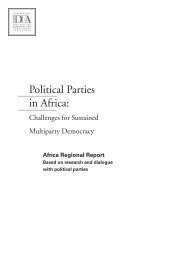Background Document - Danish Institute for Parties and Democracy
Background Document - Danish Institute for Parties and Democracy
Background Document - Danish Institute for Parties and Democracy
Create successful ePaper yourself
Turn your PDF publications into a flip-book with our unique Google optimized e-Paper software.
ulation were now able to read about current political movements <strong>and</strong> literature in<br />
<strong>Danish</strong>-language newspapers <strong>and</strong> periodicals.<br />
Due to these re<strong>for</strong>ms, it was a relatively egalitarian, prosperous, <strong>and</strong> enlightened<br />
population that took over the management of national affairs in 1848, when the King<br />
renounced absolute power <strong>and</strong> convened a constitutional assembly.<br />
Since then, the <strong>Danish</strong> Constitutional Act has been revised three times, with the<br />
latest revision adopted in 1953. The fact that the current Constitutional Act is coming<br />
up on its sixtieth anniversary is remarkable not least because the concepts of democracy<br />
<strong>and</strong> citizenship have been subject to swift <strong>and</strong> profound trans<strong>for</strong>mations in the<br />
period following World War II. Due to this singularly conservative constitutional tradition,<br />
Denmark – unlike most other nations – has not embedded a modern notion of<br />
human rights in the Constitution.<br />
DEMOCRACY AND HUMAN RIGHTS<br />
Modern democracy is defined by both a political system of government <strong>and</strong> a political<br />
ideology. Both aspects were developed during the Enlightenment, whose ideas of<br />
human rights, popular sovereignty, <strong>and</strong> social contract legitimised the abolishment<br />
of tyrannical regimes <strong>and</strong> inherited privilege. Under the watchword of “liberty, equality,<br />
fraternity”, the great majority of farmers <strong>and</strong> burghers joined <strong>for</strong>ces to combat the<br />
concentration of power in the h<strong>and</strong>s of royalty, clergy, <strong>and</strong> nobility.<br />
The gr<strong>and</strong> narrative of modern democracy is about free <strong>and</strong> equal individuals<br />
who enter into a covenant in order to institute governments that further the development<br />
from a state of barbarity, where the jungle law applies <strong>and</strong> might makes right, to<br />
civilised societies <strong>and</strong> the rule of law. The societal covenant is, in other words, a social<br />
contract under which private individuals relinquish sovereignty to public authorities<br />
that, in their turn, undertake to ensure the rights of citizens <strong>and</strong> maintain law <strong>and</strong><br />
order. From this perspective, despotism <strong>and</strong> oppression deprives individuals of their<br />
rights.<br />
This narrative was laid out with model conciseness in 1776 in the American Declaration<br />
of Independence:<br />
“We hold these truths to be self-evident, that all men are created equal, that they<br />
are endowed by their Creator with certain unalienable Rights, that among these are<br />
Life, Liberty <strong>and</strong> the pursuit of Happiness. —That to secure these rights, Governments<br />
are instituted among Men, deriving their just powers from the consent of<br />
the governed, —That whenever any Form of Government becomes destructive of<br />
these ends, it is the Right of the People to alter or to abolish it, <strong>and</strong> to institute new<br />
Government, laying its foundation on such principles <strong>and</strong> organizing its powers in<br />
such <strong>for</strong>m, as to them shall seem most likely to effect their Safety <strong>and</strong> Happiness.” 1<br />
This was followed in 1789 by the French Déclaration des droits de l’homme et du<br />
citoyen – the first declaration of human rights proper, containing a catalogue of rights<br />
<strong>and</strong> duties of democratic citizenship.<br />
HUMAN RIGHTS AND WOMEN’S RIGHTS<br />
‘Men’ <strong>and</strong> ‘homme’ can both mean human, but in the context of the two foundational<br />
texts of the democratic movement, they meant ‘man’. These documents instituted a<br />
man’s rights discourse, which was not replaced by a human rights discourse until the<br />
Universal Declaration of Human Rights was adopted by the United Nations in 1948.<br />
1 American Declaration of Independence<br />
WOMEN IN POLITICS DANISH INSTITUTE FOR PARTIES AND DEMOCRACY PAGE 47
















